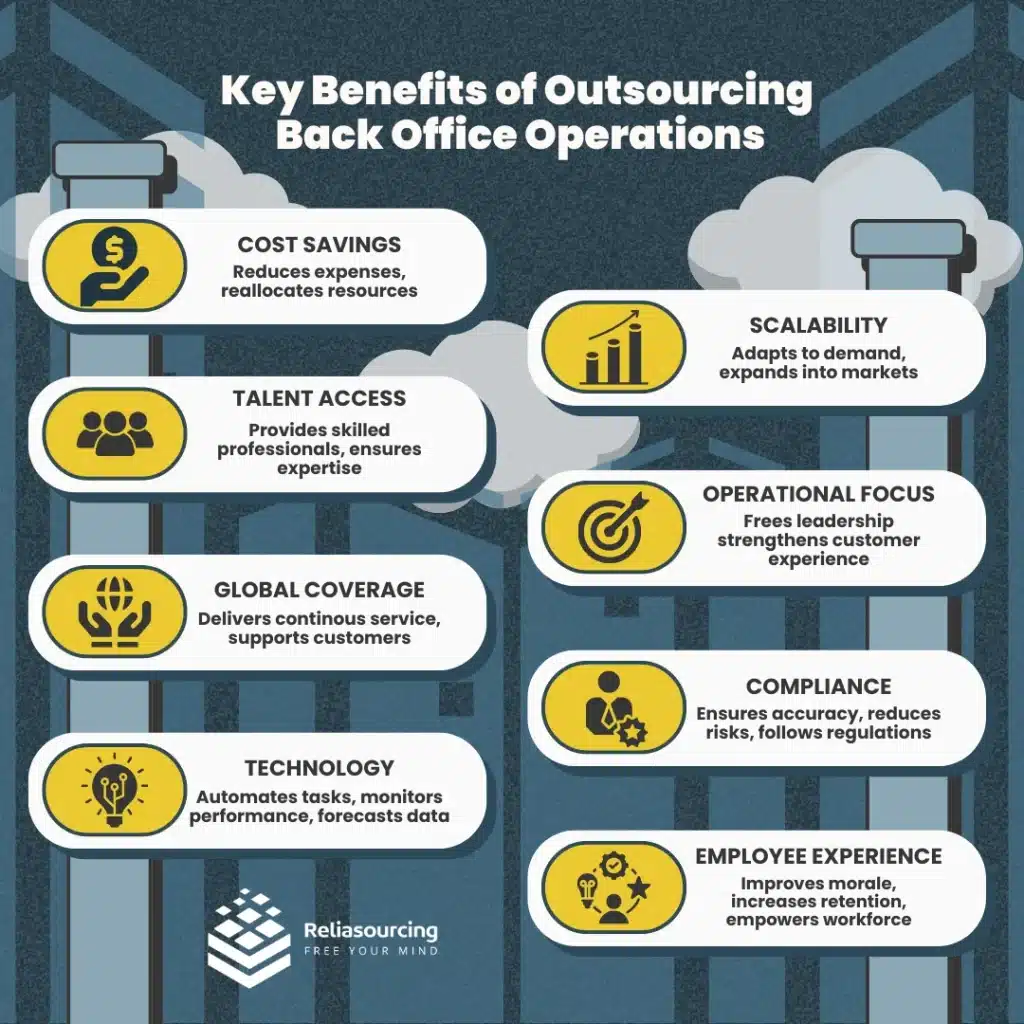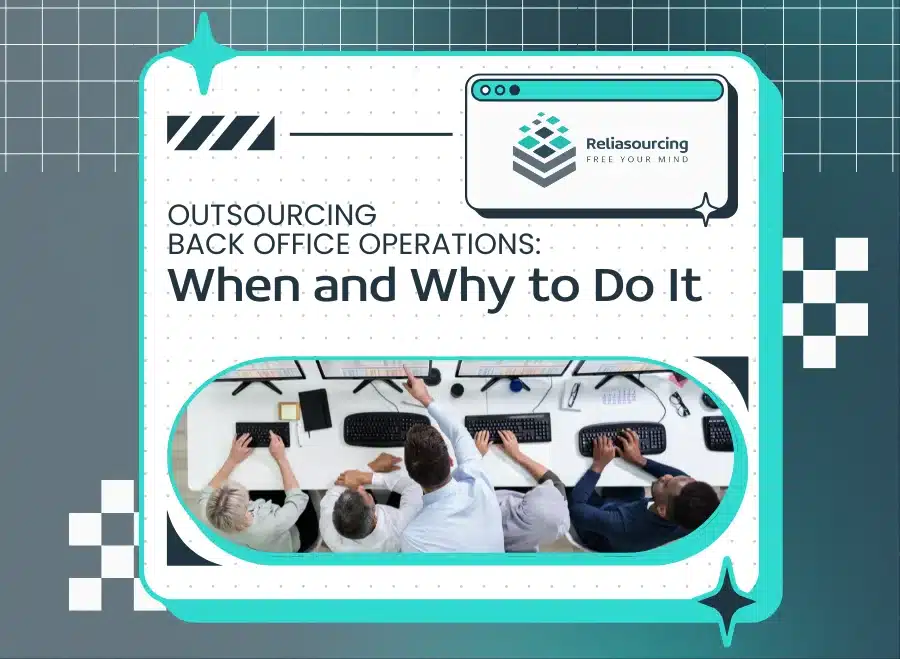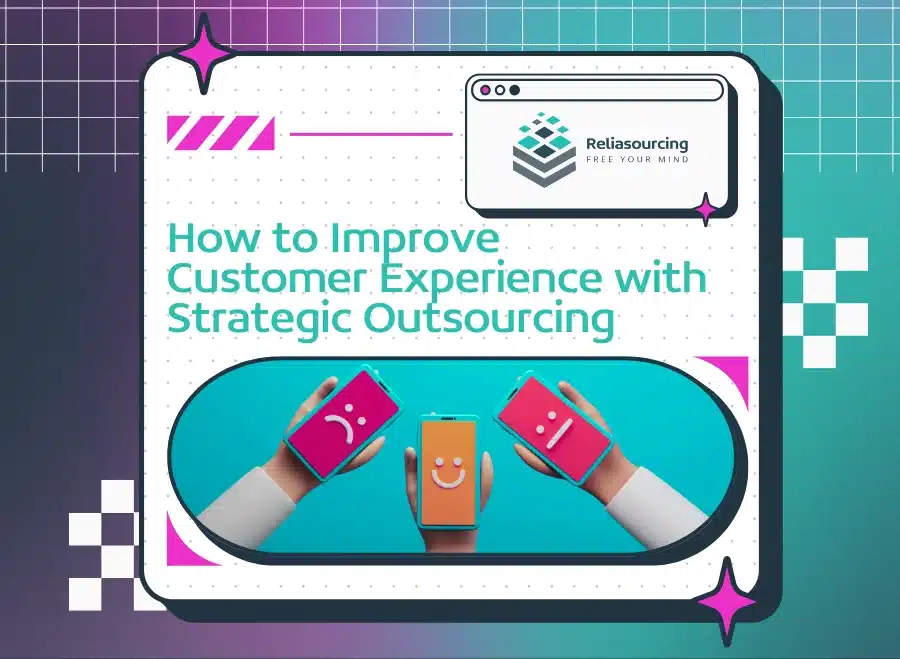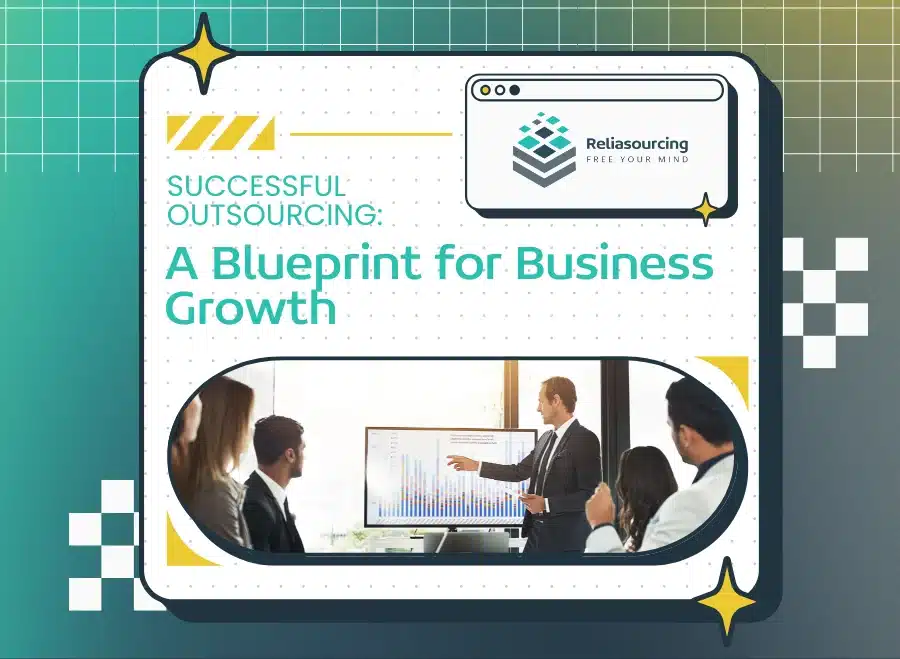Are you faced with piling internal tasks and struggling to scale? It’s no question that people want the fast way out, and often this goes haywire when mishandled. Perhaps that’s why many seek the professional support offered by back office business process outsourcing (BPO), which continues to emerge as the best way to streamline internal operations while staying agile and cost-efficient at the same time.
This article will walk you through everything you need to know about back office BPO: what it is, how it works, when to consider it, and why partnering with the right provider like Reliasourcing can drive long-term success. You’ll learn the advantages of outsourcing, get insights into industry-specific applications, and discover why this model transforms operational strategies across sectors.
What is Back Office Business Process Outsourcing?
While business process outsourcing (BPO) is the umbrella term for outsourced services, back office BPO refers directly to delegating essential internal business functions to an external service provider. Non-customer-facing operations are key to keeping a company running smoothly and compliantly, even if clients do not directly see it. Effective management of back office tasks supports front office performance by 1) ensuring reliable data, 2) timely reporting, and 3) consistent internal processes.
Unlike front office departments such as sales, marketing, or customer service, with which customers have touchpoints, the back office is concerned with operations like finance, HR, procurement, IT support, compliance, and data processing, operations that mostly go unseen but are undeniably important in keeping things in control. When handled efficiently, the processes help maintain control over finances, ensure employees are supported, and minimize risks related to regulatory obligations or data errors. For more context, standard back office functions include:
- Data entry, management, cleansing, and analysis
- Payroll and benefits administration
- IT support, infrastructure maintenance, and cybersecurity
- HR onboarding, recordkeeping, and compliance training
- Procurement, vendor negotiations, and inventory management
- Legal documentation, contract management, and regulatory audits
- Quality assurance and document verification
Back Office BPO Geographic Models
This type of service is typically delivered through different geographic models:
- Onshore outsourcing which keeps the service within the same country and offers better alignment with time zones and regulations;
- Nearshore outsourcing that works with providers in neighboring or nearby countries, and helps in balancing cost savings and accessibility; and
- Offshore outsourcing which sends work to providers in distant countries and offers significant cost advantages and 24/7 operations due to time zone differences.
Advanced BPO partnerships also offer full integration with clients’ internal systems. Remote teams often work in:
- Dedicated team models, where outsourced employees act as an extension of the in-house team and use the same tools and workflows; and
- Shared service models, ideal for companies that need flexible, transaction-based services without long-term commitments.
With the widespread adoption of cloud technologies and communication platforms like Slack, Zoom, and project management tools (e.g., Asana, Trello), BPO partners can collaborate in real time, ensuring transparency, productivity, and cohesion across time zones. Additionally, many BPO vendors offer tailored onboarding programs, transition planning, performance management systems, and regular reporting, making it easier for businesses to continually and consistently maintain alignment, measure ROI, and optimize outsourced operations.
In short, back-office BPO works behind the scenes to maintain your internals and free you of the hassles of maintaining them in-house.
Key Benefits of Outsourcing Back Office Operations

In the first place, there are many reasons why companies outsource work, but outsourcing back office duties tends to target more specific pain points. Positioning businesses to navigate competitive markets, reducing operational drag, and scaling intelligently are among the benefits that outsourcing back office operations can achieve. In this section, we explore the many dimensions of value that back office outsourcing offers, especially for growth-driven organizations.
1. Cost Savings with Long-Term ROI
Outsourcing can reduce labor costs by up to 70%, but the benefits extend far beyond payroll. Businesses also save on:
- Real estate and infrastructure (no need for additional office space)
- Recruitment and training costs
- Software and systems licensing
- Employee benefits and compliance administration
What emerges is sustainable cost efficiency, savings that can be reallocated toward R&D, market expansion, or product innovation, creating a growth loop driven by operational excellence.
2. Unmatched Scalability and Business Agility
Scalability is a major differentiator in today’s volatile market. Outsourcing enables companies to:
- Scale teams up or down rapidly without complex hiring processes
- Respond to seasonal or project-based demand surges
- Expand into new markets with localized support staff
For example, an e-commerce brand may double its support team during holiday peaks, while a SaaS startup might outsource QA during a major software release cycle.
3. Access to Specialized, Industry-Ready Talent
Top-tier BPO firms provide access to skilled professionals in roles like:
- Certified accountants and financial analysts
- IT engineers, cybersecurity analysts, and support desk agents
- HR professionals experienced in international labor law
This is especially valuable for small and mid-sized businesses that can’t afford to hire niche roles internally. Additionally, outsourcing partners often provide continued education and upskilling for their staff, ensuring you always work with current expertise.
4. Operational Focus and Strategic Clarity
Outsourcing routine but vital back-office tasks allows internal leadership to concentrate on:
- Driving innovation and core product development
- Strengthening customer experience and retention
- Strategic planning and business growth initiatives
A shift from reactive to proactive management fosters a culture of innovation and accountability within the organization.
5. True 24/7 Global Coverage
Global businesses need global support. Back office outsourcing allows:
- Continuous service delivery across time zones
- Shorter turnaround times for critical tasks
- Around-the-clock support for customer operations and IT systems
For logistics companies monitoring shipments overnight or SaaS firms supporting users globally, 24/7 coverage acts as a real-time safety net and gives a competitive advantage.
6. Improved Accuracy, Compliance, and Risk Reduction
Regulatory landscapes vary by industry and region. Outsourcing partners:
- Provide compliance-trained staff (HIPAA, GDPR, SOX, PCI-DSS)
- Follow rigorous SOPs and quality control procedures
- Offer audit trails and reporting frameworks
In healthcare, finance, and legal industries where documentation and precision are paramount, this is particularly important. Mistakes in these sectors can be costly, both financially and reputationally.
7. Built-In Technology and Innovation
Modern BPO providers bring not only people but also platforms. Many offer:
- Proprietary software for task automation and workflow tracking
- Business intelligence dashboards for performance monitoring
- AI-driven tools for data processing, forecasting, and customer interaction
Companies can leapfrog technology hurdles by tapping into this innovation stack, avoiding large upfront investments in infrastructure.
8. Enhanced Employee Experience and Retention
When internal staff are freed from repetitive administrative work, they can:
- Take on more strategic roles
- Engage in professional development
- Focus on creative, high-value tasks
When outsourcing is approached as a force multiplier rather than merely a way to cut costs, it results in improved morale, greater retention, and a more empowered workforce.
In short, the benefits of outsourcing extend far beyond efficiency. Implementing it with the right partner becomes a key driver for growth, innovation, and resilience.
Types of Back Office Services Typically Outsourced
Here’s a detailed breakdown of commonly outsourced back office services, including expanded descriptions and deeper insight into how each service applies across various sectors. Outsourcing these functions is intended to delegate repetitive tasks, enhance accuracy, improve workflow, and gain access to specialized tools and professionals.
| Service Category | What It Covers | Industry Use Cases |
| Data Management | Data entry, cleansing, migration, database setup, master data governance | Healthcare records processing, e-commerce inventory updates, logistics tracking and reporting |
| Finance & Accounting | Payroll, bookkeeping, AP/AR, tax filing, budgeting, financial analysis | Fintech account reconciliation, SaaS recurring billing, e-commerce financial reporting |
| IT Support | Technical helpdesk, system updates, cybersecurity, infrastructure monitoring | Gaming server uptime support, SaaS customer tech support, logistics tracking platforms |
| Human Resources | Sourcing, recruitment, onboarding, employee records, benefits administration | HR process management for healthcare staff, global hiring for fintech startups, seasonal logistics |
| Administrative Support | Scheduling, transcription, email management, CRM upkeep, travel arrangements | Law firm case documentation, real estate appointment setting, executive support in finance firms |
| Compliance & QA | Auditing, ISO documentation, regulatory reporting, internal controls | HIPAA compliance in healthtech, PCI DSS adherence in fintech, SLA monitoring in logistics |
| Customer Support (Non-front office) | Tier 2 ticket management, back-end fulfillment, returns, refund processing | E-commerce RMA processing, insurance claim backend validation, ticket escalation in gaming platforms |
| Procurement Support | Vendor onboarding, purchase order processing, invoice verification | Manufacturing supply chain documentation, retail vendor management, cross-border sourcing support |
| Document Management | Digitization, archiving, template standardization, cloud migration | Healthcare record digitization, legal document indexing, enterprise digital transformation projects |
| Data Annotation & AI Ops | Labeling, training data curation, model feedback loops | AI product development for SaaS, sentiment analysis in gaming, LLM training pipelines in fintech |
Expanded Industry Use Cases
In healthcare, outsourcing back office services ensures HIPAA-compliant handling of electronic health records (EHR), insurance claims, and patient billing support. Specialized providers offer credentialed medical coders and QA experts familiar with ICD-10 and other standards.
For e-commerce brands, BPO vendors manage SKU listing updates, pricing data, return and refund processing, and customer query tagging. This improves speed-to-market and frees up in-house teams to focus on campaign management and strategy.
Precision and compliance are paramount in the fintech and banking sectors. Outsourced teams manage account reconciliation, regulatory reporting (e.g., SOX compliance), anti-money laundering (AML) checks, and internal auditing functions. They also support app maintenance and customer dispute management.
Gaming companies, particularly those operating globally, use outsourcing for technical ticket resolution, code QA, content moderation, and behavior tracking, all to ensure 24/7 availability and allow in-house developers to focus on product innovation.
In the Artificial Intelligence (AI) industry, companies outsource data tasks like annotation, processing, and quality control to BPO partners, enabling focus on research and model development with reliable, high-quality data foundations.
And even in the SaaS industry, where much is digital-first, BPO plays a major role in billing cycle management, subscription analytics, churn forecasting, and client onboarding.
Diversifying the services outsourced and collaborating with the right partner can help companies future-proof their operations, increase transparency, and maximize ROI while maintaining full oversight through SLAs, reporting dashboards, and workflow integrations.
In-House vs. Outsourced Back Office: Key Differences
Weighing your options for scaling support functions? Understanding the operational trade-offs between maintaining and leveraging in-house teams and outsourcing is essential. The comparison goes beyond simple cost metrics, touching on agility, innovation, accountability, and long-term adaptability.
Here’s how outsourced models stack up against traditional in-house setups:
| Feature | In-House | Outsourced |
| Cost | High overhead: salaries, benefits, equipment, office space | Lower labor costs, minimal overhead, pay-as-you-go models, and operational efficiency gains |
| Talent Access | Limited to local talent pools and lengthy recruitment cycles | Instant access to global professionals with niche expertise in various industries |
| Scalability | Dependent on HR bandwidth and training programs | Rapid team expansion or downsizing based on real-time business needs |
| Control | Full oversight, direct reporting lines | Structured via SLAs, clear accountability, with flexibility built into engagement models |
| Technology | Internal software requiring upgrades and licenses | Providers offer proprietary tools and robust tech infrastructure |
| Risk Management | Managed internally with limited redundancy | Built-in quality assurance, redundancy, and compliance protocols across global frameworks |
| Cultural Fit | Tailored to internal values and company ethos | Requires onboarding but often adaptable through co-branding and hybrid team models |
| Compliance & Security | Internal responsibility for meeting legal standards | Dedicated compliance teams and adherence to international data protection laws |
| Innovation Velocity | Often constrained by budget and headcount | Supported by diverse global insights, automation expertise, and best practices |
When Should You Consider Outsourcing?
- Rapid Growth Phase. If your business is scaling faster than your internal hiring and onboarding can keep up, outsourcing can bridge the gap without sacrificing operational stability.
- 24/7 Operational Needs. Companies serving global markets often require support outside standard working hours; outsourcing fills this need with continuous coverage.
- Cost Control Priorities. Outsourcing is ideal for startups and SMBs looking to reduce fixed expenses without compromising quality.
- Specialized or Temporary Projects. Some tasks (e.g., regulatory audits, system migrations, seasonal campaigns) are not needed full-time. Outsourcing offers flexibility without permanent headcount.
- Technology Limitations. When in-house systems are outdated or costly to upgrade, outsourcing providers often bring turnkey solutions with the latest platforms.
Evolving the Hybrid Model
It’s worth noting that many modern organizations are adopting a hybrid model, combining in-house strategic functions with outsourced execution. For example, a company might retain an in-house finance strategist while outsourcing payroll, invoicing, and accounts receivable. Similarly, a core HR team may define culture and performance management while external partners manage hiring and benefits administration.
Companies gain the ability to retain critical control and brand DNA while reaping the efficiencies and scalability of outsourcing, and the result is simply a lean, focused, and future-ready operation built for resilience and speed.
How Reliasourcing Helps with Back Office Outsourcing
Reliasourcing specializes in building customized offshore teams that support everything from data processing to IT helpdesk management. We aim to be your long-term partner, prioritizing seamless collaboration, measurable performance, and cultural alignment.
Why Partner with Reliasourcing?
- Tailored solutions. We match you with professionals trained in your industry—gaming and entertainment, SaaS, finance, or e-commerce.
- Seamless integration. Your offshore team operates as an extension of your brand, adopting your tools, culture, and KPIs.
- Scalable infrastructure. We scale with you, whether you need two finance assistants or a 20-person support desk.
Data security focus. We maintain rigorous compliance and security protocols that meet global standards.
What Sets Us Apart
Reliasourcing offers domain-specific expertise by supporting sectors such as SaaS, fintech, e-commerce, gaming, logistics, and healthcare, providing deep operational alignment from Day 1.
Flexible scaling options are available, ranging from a single data entry specialist to an entire finance processing team, with dedicated groups built around specific KPIs and workflows. AI-enhanced operations combine human accuracy with smart automation through access to AI-powered outsourcing solutions, leading to improved speed, accuracy, and cost savings.
Additionally, our team prioritizes a security-first approach, following ISO standards and global compliance frameworks to ensure data protection and maintain brand trust.
Hear from our Clients


Frequently Asked Questions
What is considered back office work?
Back office work includes roles that support the business internally and ensure that day-to-day operations run without disruption, freeing up leadership to focus on business growth. Common functions include:
- Data entry and document processing
- Finance and accounting
- HR and payroll
- IT administration
- Procurement and vendor management
- Reporting, compliance checks, and internal auditing
What are examples of back office outsourcing?
Some examples of back office outsourcing include data entry for logistics and e-commerce, payroll processing for startups and SMBs, IT support for SaaS and gaming platforms, bookkeeping and invoice processing in healthcare and fintech, and document management and compliance checks for legal or regulated industries.
Is back office outsourcing cost-effective?
Yes, back office outsourcing is cost-effective, especially when done strategically, since outsourcing can yield:
- Lower salaries and overhead
- Faster onboarding and training cycles
- Technology savings (software licenses, security tools)
- Improved error rates and productivity metrics
The ROI often outweighs the initial setup costs, especially when scaling quickly or needing 24/7 coverage. However, be mindful of hidden costs. It helps to look into the cost of outsourcing and the possibility of poor communication, unclear SLAs, or lack of cultural fit.
How do you choose the right back office BPO provider?
Choosing the right back office BPO provider involves considering key criteria: proven industry experience, clear service-level agreements (SLAs), strong references or case studies, data security and compliance certifications, and cultural alignment along with effective communication tools.
Watch for red flags like unclear pricing, lack of transparency, or poor cultural alignment.
Summary and Final Thoughts
Back office outsourcing gives the necessary boost, especially in sectors where speed, cost-efficiency, and accuracy are crucial. Outsourcing makes managing a healthcare clinic, a successful SaaS platform, or a growing logistics company easier, allowing you to focus on innovation and expansion.
Leaders can shift their focus beyond daily operations to boosting revenue, enhancing customer relationships, and exploring new markets. Partnering with a reliable BPO provider transforms your back office into a strategic asset.
At Reliasourcing, we see ourselves not just as a provider but as a partner committed to your growth. We offer flexible, scalable solutions that adapt to your business. From customized hiring pipelines to personalized onboarding programs, we craft every solution to meet your specific business objectives.
Want to explore how Reliasourcing can help you scale smarter? Contact our team today or learn more about our solutions for business growth.







